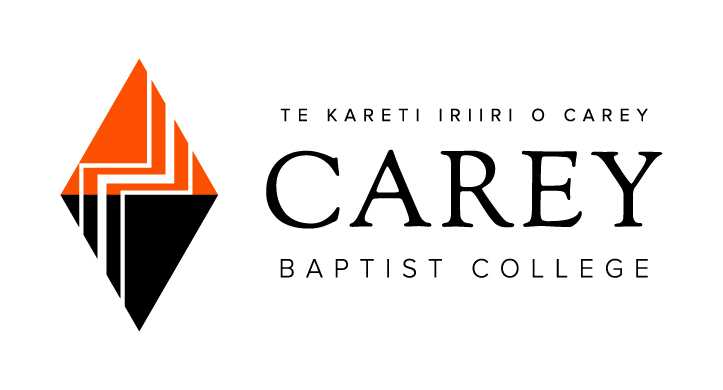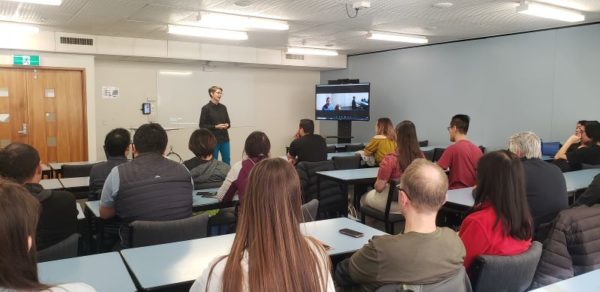Carey Unveils New Brand
Carey Baptist College launched its new branding on 2 November 2021. As Principal John Tucker explains, the new look is a reflection of its values and strategy.
“Carey is the theological college of the Baptist churches of New Zealand, established almost 100 years ago to train men and women for gospel ministry at home and abroad. That is still our calling. Nothing has changed. We serve the church by training leaders for ministry and mission. How we do that, however, has obviously changed over time,” says John.
“From 2018 and into the beginning of 2019 the college went through a deep listening exercise. During this strategic review, we were asking the Lord to guide us into the next stage of our journey as a college. As a result of this process, we’ve discerned a series of strategic priorities that will enable us to meet the changing needs of our churches, producing more graduates who can bring gospel renewal to people and places.
“This rebranding exercise is primarily about communicating more clearly to our family of faith communities who Carey is and how it can serve them. We want to articulate both to church leaders, and to all the people in our churches, how Carey can help them grow in their faith and their ministry.”
Carey’s new logo
The icon in Carey’s new logo features two triangles. The top triangle symbolises a mountain and the bottom one its reflection in water. Threading its way up the mountain is a step pattern. This poutama design is common in Māori art. It can represent whakapapa, as well as ascension or growth through various levels of learning and education.

“The icon has been carefully chosen,” says John. “It draws on concepts in te ao Māori. Studying theology and training for ministry is like journeying up a mountain. It offers you a new vantage point, a new position from which to see and prepare for the future into which Jesus is calling you.”
John was particularly impressed by how beautifully this image of climbing a mountain connects with Carey’s five values as a Christian learning community: gospel, formation, integration, community and mission.
Gospel
At the heart of Carey’s training is a deep commitment to the gospel of Jesus Christ and its power to transform.
“Our prayer for each student is that, through their journey with us, they would see Jesus more clearly and understand the gospel more fully,” says John.
“I love the transfiguration story. The gospel writers say that Jesus took Peter, James and John with him, and led them up a high mountain. There he was transfigured before them. His face shone like the sun. His clothes became as bright as lightning. A bright cloud covered them, and a voice from the cloud said, ‘This is my Son, whom I love; with him I am well pleased. Listen to him.’
“At Carey, we listen to Jesus. Across all our programmes, the written word is our basis; the living Word is our focus. Our new logo, with its image of a maunga, speaks to this. Climb the mountain with us, and your love for Jesus will grow.”
Formation
Along with this focus on the gospel, is a focus on formation.
“Read the gospels and you see a Master Teacher at work. Jesus is forming his disciples by teaching them not just how to think, but how to serve, how to live, how to love. Gospel leadership requires not just deep biblical convictions, but robust ministry skills, and mature Christian character,” says John.
“So, at Carey, alongside our academic programmes, we provide a range of specialised formation tracks. These pathways combine intensive personal mentoring with supervised ministry experiences to form our students for effective leadership and faithful discipleship. Carey’s new logo, with its image of an inverted triangle, points to this focus on character and integrity. Jesus’ kingdom is an upside-down kingdom, where service and character are the mark of greatness.”
Integration
This leads to a third core value.
“Carey has a distinctively integrative approach to theological learning. As one of New Zealand’s top-ranked research institutions outside the university sector, we believe in rigorous academic learning, but learning that connects or integrates the church with society, theory with practice,” says John.
“Again, the logo points to this. Climb the mountain with Carey, and you will learn to look in every direction. You’ll learn to look backwards at the story of our faith tradition (God’s word). You’ll learn to look outwards to the realities of our context today (God’s world). And you’ll learn to look forwards and prepare for the future – the practice of ministry and mission (God’s work).
“Crucially, you’ll learn to bring God’s word, God’s world and God’s work together in a way that equips you for discipleship and ministry in a rapidly changing world.”
Community
“At Carey, this means community,” says John.
“We’re deeply convinced that the best learning happens in the context of relationship. Jesus demonstrates this by the way he took his disciples with him on his journeys – up high mountains, down deep valleys. We don’t climb the mountain on our own. Learning is a relational activity. This value is expressed by the three lines that run together to make the stairway.
“For us, the principle of whakawhanaungatanga – connecting with one another – is very important. We work very hard at weaving strong relationships among staff and students. Climb with us, and you will be surrounded by a genuinely supportive community. And a diverse community. At Carey, we celebrate the bicultural heritage and the multicultural reality of Aotearoa. We aspire to be a learning community that embodies the vision of te Tiriti o Waitangi – a community where all peoples and cultures can flourish.”
Mission
Which brings us to mission, the fifth and final of Carey’s core values.
John says, “At Carey we believe that the God who we worship is at work in the world by the Spirit to reconcile and renew all things in Christ. All our learning is oriented towards fuller participation in the mission of God.
“Our new logo, with its stairway up a mountain, highlights this commitment to mission. Throughout the Bible, mountains are places where God meets with his people to commission them for service in the world. You see this with Moses. You see it with Israel. You see it with Elijah. You see it with Jesus’ disciples. The mountain is a place of divine encounter for the sake of mission in the world.
“Our logo meshes with this story, and with our calling as a theological college. Through their studies with us, our students climb the mountain. They encounter Jesus in new ways and are transformed in order to participate more fully in God’s mission in this world.”
Carey’s strategic priorities
With these foundational values in place, Carey’s recent listening exercise generated several strategic priorities to guide the college over the coming few years.
One of these priorities involves the accessibility of Carey’s training. Feedback from pastors and churches across the country highlighted the need for training, and especially pastoral leadership training, to become more accessible. Therefore, improving the delivery of online, blended and flexible learning models across New Zealand has become one of Carey’s strategic priorities.
In 2020 Carey launched a regional pathway for ministry training. In the past you could study theology through Carey from anywhere in New Zealand. But if you wanted to train for pastoral leadership you had to be an on-site student based in Auckland.
“We used to say to churches and pastors, ‘Send us your best emerging leaders. We’ll train them in Auckland and send them back to you.’ Now our message is this: ‘Who are you best emerging leaders? We can train them where they live. They don’t need to move to Auckland. Carey will come to you!’” says John.
Through a combination of residential intensives and online classes, pastoral leadership students are now able to access leadership training, skill development, personal mentoring and formal theological study wherever they’re located.
“This year we introduced a herd of ‘COWs’ (computers on wheels) to enable live classrooms across all our programmes. Emerging leaders based in Baptist churches across Aotearoa are now able to participate synchronously in all classes, engaging in discussion and asking their questions,” says John.

Regional hubs are also being set up at key churches in each of the regions. These provide a place of support and resourcing for local students from across the region. Another one of Carey’s strategic priorities concerns the provision of non-formal learning.
Carey’s Centre for Lifelong Learning has been a key initiative in recent years designed to provide accessible non-formal learning for pastors and Christian leaders throughout New Zealand, primarily through online lectures.
“A new suite of webinars and courses has recently been launched for 2022,” says John. “This is the product of sustained listening to Baptist pastors, regional leaders and national leaders across our movement. We’ve heard what people sense they need to be learning about. And we’ve responded by curating courses like this
- Sexuality and Gender Identity: A theological, biblical, pastoral and missional response
- Supporting the mental health of your congregation and community
- Learning wise living from biblical wisdom literature
- Worship: praying with all the people of God
- Whole Bible, whole mission, whole life: a study of mission with Chris Wright
“You don’t have to be a pastoral leader to access this content. The Centre’s live interactive online lectures provide accessible, robust, home-grown resources for church life groups and discipleship programmes across Aotearoa.”
Another important strategic priority has focused Carey on becoming an intercultural learning community that embodies the vision of Te Tiriti.
“We want to model well how to journey faithfully as Tangata Whenua (Māori) and Tangata Tiriti (all those other ‘tribes’ that have entered Aotearoa through the Treaty of Waitangi). This means connecting better with our ethnic or migrant church communities.” In 2019 Carey established Ngā Pou Amorangi, a programme designed by Māori to equip Māori leaders for ministry in te ao Māori and bicultural contexts. This year the first graduates from this programme have emerged to serve in a variety of gospel ministries. In 2020 the college launched Hoea, a new Māori Theological Research Centre. The objective of this initiative is to nurture quality integrative research into local issues concerning Māori, ministry and mission.
Te Ao Māori (Māori world view) is now a compulsory course for all diploma and degree students.
“We want all our students to know how to engage in Christian ministry in a bicultural context,” says John. “The dream is that, as a result, immigrants and non-white people will no longer feel marginalised when they gather for worship on a Sunday because we will be so much more sensitive to the way that we have tended to privilege Pākehā ways of seeing the world and practising our faith.”
New look, same calling
Rebranding projects take a lot of time and effort on the part of many people. In this instance it involved Carey staff, Carey board members, Assembly Council members, students, graduates,and Te Kāhui Whakaruruhau o Carey (the college’s Māori advisory group). From this latter group, Sandy Kerr, Sean Delany, Ray Totorewa and Denise Tims played a crucial role in developing the logo. Husk, the creative agency facilitating the rebrand, were chosen because it is led by Christians who readily embraced the college’s values.
This rebranding journey has been filled with lots of learning about communication and engagement with different perspectives. Like all rebrand exercises, it’s brought a sense of freshness and aspiration for the future. However, as John says, some things haven’t changed.
“Carey exists to serve the church by equipping people to bring gospel renewal in their churches and communities. This rebranding does not signal a departure from our primary calling. It represents, instead, an ongoing, renewed and strengthened commitment to that calling.”
0 Comments